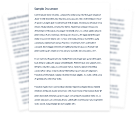Memorandum of Understanding (MOU)
A Memorandum of Understanding is a non-legally binding precursor document that allows you to record proposed terms with another party during the negotiation stage.
4.3 (186 reviews)
Last updated October 23, 2025
Under 10 minutes
Suitable for Australia
Written by Edwin Montoya Zorrilla
Reviewed by Damin Murdock
Document Overview
If you are interested in entering into a formal agreement or formal contract with another entity, a Memorandum of Understanding (MOU) is a good document to start with if further negotiations ensue. A Memorandum of Understanding is a preliminary written agreement, though non-legally binding, sets out the intentions of the parties involved and their proposed terms & common vision in the negotiations with consent. After the Memorandum of Understandings commencement date occurs, you will be able to record what has already been agreed on before a legally enforceable document is executed.
As with any business dealing, it is paramount that both parties understand each other's goals and objectives. While this can be difficult at times, an MOU can be a great asset to your business relations. Without clear terms and effective communication, dealings will likely fail. This is why an MOU is greatly beneficial. Parties are able to simply set out their requirements and expectations. As a result, this will establish a common intention for future engagements.
Additionally, if you're communicating sensitive information to potential investors, it is essential to ensure this information is protected with a Memorandum of Understanding.
The Legal Risk Score of a Memorandum of Understanding (MOU) Template
Our legal team have marked this document as low risk considering:
- The document explicitly states that the terms are not legally binding except where specifically stated, which could lead to uncertainties in the enforceability of the agreement until a final contract is signed.
- Each party bears their own costs related to the negotiation and preparation of the agreement, regardless of whether the agreement proceeds, potentially leading to significant expenses without guarantee of a final agreement.
- The memorandum does not automatically confer benefits or rights to parties outside the agreement, limiting the scope of influence and protection to just the signatories.
Overall, this document presents a moderate risk level as it establishes a framework for negotiation without committing either party to a binding agreement prematurely. This could be beneficial in providing flexibility during negotiations but also means there's less immediate security regarding the outcomes of these discussions. Users familiar with business negotiations might find this arrangement suitable as it allows for adjustments before entering into a binding agreement.

Memorandum of Understanding (MOU) Checklist
Complete your free Memorandum of Understanding (MOU) with our checklist
Ensure Proper Signature Execution
Ensure that all parties involved sign the document on the dates indicated at the end to validate the Memorandum of Understanding.
Keep Negotiations on Track
Adhere to the agreed timescale for negotiations and aim to finalise and sign the Proposed Agreement by the specified date.
Manage Termination and Document Handling
If terminating negotiations, follow the prescribed steps for notice and the return or destruction of materials as outlined in the document.
Monitor Legal Compliance
Stay informed about the legal obligations that are binding as per the Memorandum, and ensure compliance to avoid liabilities.
Use this Memorandum of Understanding (MOU) if:
- You would like to set out the proposed terms between you and another party during the negotiation stage to avoid later confusion.
What does the Memorandum of Understanding cover?
- Limiting the use of confidential information (intellectual property rights);
- Prohibition of duplicating memorandum; and
- Limitation of liability.
Other names for Memorandum of Understanding include:
- Letter of Understanding
- Gentlemen's Agreement
- Memorandum of Agreement
- Heads of Agreement
- Statement of Agreement
In what situations are Memorandum of Understandings commonly used?
A memorandum of understanding is mostly used to record what has already been agreed on before a legally enforceable document is executed. It is often used in cases where parties intend to not imply a legal commitment, whether it's in the early stages of an agreement and both parties are skeptical or there is no intention of a legally binding agreement in a deal.
Business negotiations can be rocky and uncertain at times. They can be particularly hazy at the beginning of relations between the parties. There is nothing worse than disagreeing with your business partner over contract terms. Hence, MOU’s provide a great safeguard to reduce the risk of uncertainty in expectations and objectives. Specifically, this is beneficial in commercial partnerships and relations where the engagement is over a prolonged period. Setting out clear prospects and ambitions in the initial negotiations can avoid disagreements between the parties. It can also reduce the risk of uncertainty when drafting the formal contract. This is because the proposed terms are already set out and agreed upon by the parties.
Even for experienced businesses, entering into a formal contract can be daunting when the project is complex or over a long period of time. Therefore, an MOU can put your mind at ease. Having the proposed terms already set out in a prior document provides a framework for future dealings. The MOU can be used as a basis for the future contract. It can also be referred back to as a reminder of the parties objectives and intentions if any confusion arises. In complex or high risk situations, it is always best to be on the safe side. Having a formal document in advance ensures parties are on the same page.
What’s the difference between a Memorandum of Understanding and Letter of Intent?
Memorandum of Understanding sets out the proposed terms in the negotiation stage, however, it is not legally binding in nature. A letter of intent is used in most large business transactions and outlines the process of negotiation and provides a structure for how things will proceed in the intended agreement. Unlike a memorandum of understanding, provision of a letter of intent can be considered legally binding in regards to certain provisions, if specified within the letter of intent. Overall, if you are looking for a document that is a legally binding contract, a Letter of Intent is a great.
Can a Memorandum of Understanding expire?
Yes a memorandum of understanding can expire. As it is generally not a legally binding document, there is no need for a termination clause to end negotiations that take place within the memorandum. Generally, the parties within the memorandum will come to an agreement to terminate negotiations and the memorandum will cease to continue and be effective in nature.
If you find your objectives do not align, exiting the agreement is much easier with an MOU than with a legally binding contract.
How much detail does my Memorandum of Understanding need?
A memorandum of understanding does not require excessive amount of detail, in that every detail of the agreement and the companies be listed. However, there are certain elements that should be recorded to ensure that the memorandum is drafted effectively. A memorandum of understanding should state the the intent of the agreement in regards to the parties involved. The clauses should be set out to ensure that the intentions of both parties are pure, in that there are no ulterior motives or underlying issues along those lines. The memorandum should also outline the roles of the parties involved, such as what the directors and workers will do to effectively implement the agreement. It is also important to provide a time when the partnership commences and terminates, so that there are no disputes regarding these issues in the future.
The memorandum should also outline the roles and responsibilities of each party. In outlining the parties responsibilities, the sole responsibilities of each organisation should be acknowledged, as well as the collective responsibilities regarding the organisations conduct with each other. The memorandum should contain any potential disclaimers each party wants to include. If there are any joint financial transactions between the parties involved in the memorandum, the specificities of such transactions should be outlined with who pays for what and how it is paid for.
Once the terms and clauses are created, both partners should sign the agreement to start the agreement between the relevant parties. Before doing so, make sure you seek legal advice to ensure that all the terms and conditions are suited for your party and that you are legally protected in case anything goes wrong throughout the duration of the agreement.
Should I get this document reviewed by a lawyer?
A memorandum of understanding is generally not legally binding, so in most cases a lawyer will not be needed. However, to ensure that the memorandum does not become legally binding through the duration of the agreement, it is essential you hire a lawyer to analyse the conditions in order to clarify whether there may be legal ramifications if you breach a term that can to terminate the agreement. Hiring a lawyer will ensure that both you and your company are aware of possible legal ramifications in regards to a memorandum of advice, and will also advise you if there are no possibilities of legal ramifications within the agreement as well.
Other documents you may need:
Further information
View Sample Memorandum of Understanding (MOU)
It's never been so easy
Sign-up to a free Lawpath account
Get started and we'll take care of you. It's that easy.
Browse our 500+ legal documents
Browse our 500+ legal documents to find the perfect match to cover your business needs. We've got Compliance, Employment, Service agreements and more.
Collaborate with e-Sign and Sharing
Having access to your legal documents has never been easier. You can request e-signature, share the document and download for an efficient collaboration.
Create unlimited legal documents and eSignatures for only $39/month.
Upgrade to a Lawpath legal plan to boost your new business.


Here's what people say about Lawpath's Memorandum of Understanding (MOU)
Reviews are managed by BazaarVoice and comply with the BazaarVoice Authenticity Policy. Reviews are independently verified by BazaarVoice and detail our customers' real experiences.
0 reviews
Most Recent
Highest to Lowest Rating
Lowest to Highest Rating

